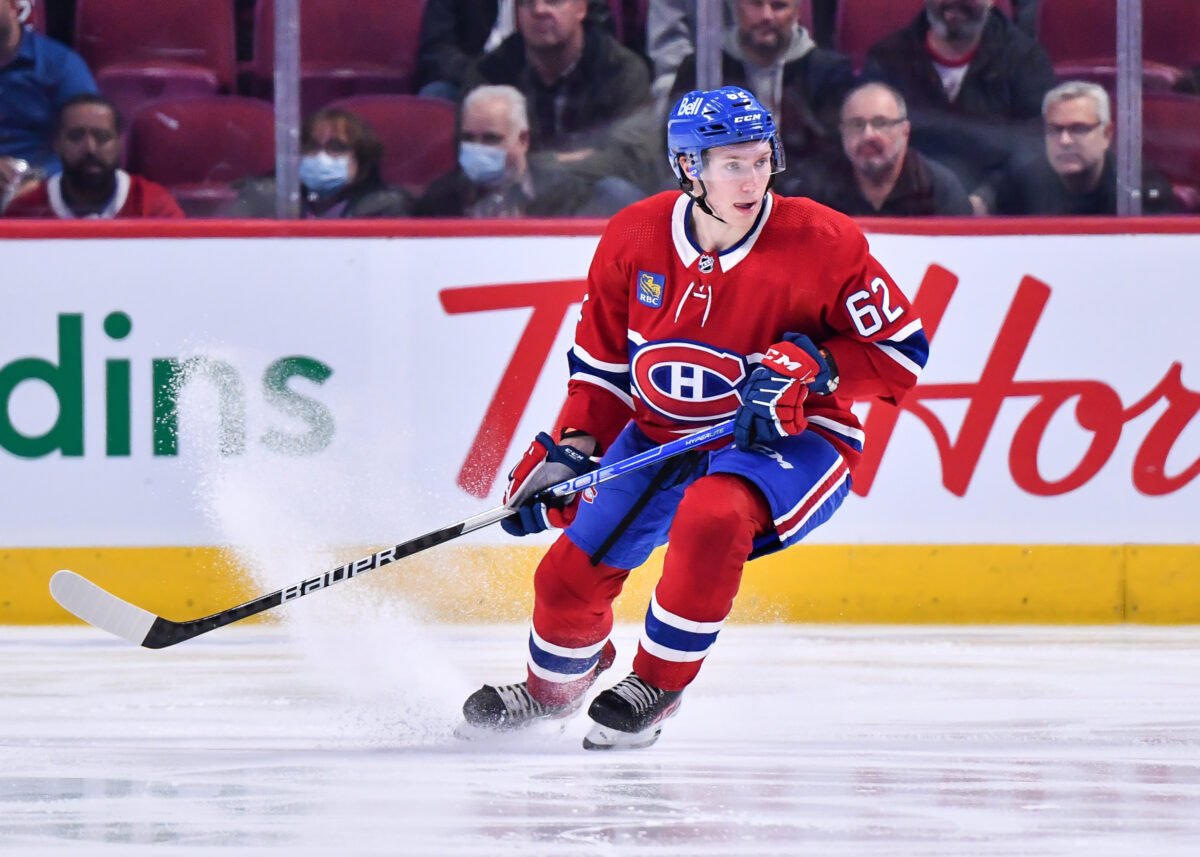Around this time last year, Montreal Canadiens general manager Kent Hughes traded defenseman Johnathan Kovacevic. The implication was clear, how, despite his right side being among the Habs’ weakest positions from a depth perspective, Hughes was clearing a path for either Logan Mailloux or David Reinbacher to make the team out of training camp. Things didn’t work out that way though, which perhaps has led Hughes to exercising extra caution, to a fault, in his approach to developing Owen Beck.
Maybe other factors played a part in the Kovacevic trade. He only had a single year left on his deal at the time, with his play eventually resulting in a significant raise from the New Jersey Devils to a cap hit of $4 million. Still, it’s very easy to second-guess the decision to trade the guy, especially in retrospect. Reinbacher suffered a serious knee injury the following training camp and, despite continuing to pile on to his list of accolades in the American Hockey League, Mailloux got traded to St. Louis Blues for forward Zachary Bolduc earlier this offseason, after he had been by all appearances deemed some combination of still-not-quite NHL-ready and obsolete after the acquisition of Noah Dobson.
Canadiens Deeper up Front
Bolduc represents one of several acquisitions Hughes has made to fortify his forward group this summer, which makes it harder for a prospect like Beck to crack next season’s lineup. In principle, Bolduc replaces (and represents an upgrade relative to) winger Emil Heineman, who went the other way in the Dobson trade. And, even though there’s largely a net-zero effect overall with the signings of Joe Veleno and Sammy Blais (and Alex Belzile to a lesser extent) to counteract the free-agent departures of Christian Dvorak, Joel Armia and Michael Pezzetta, you have to believe members of Beck’s camp were left watching Hughes’ offseason unfold thinking, “What about me?”
If you assume the Canadiens signed Blais with the idea of him filling Pezzetta’s physical role as an extra forward following their first-round loss to the Washington Capitals (despite him having played all of 2024-25 in the American Hockey League), that leaves two roster spots for Beck, Veleno, Oliver Kapanen, Joshua Roy and maybe Florian Xhekaj over which to fight, Belzile presumably destined for the AHL. Assuming the second-line spot at centre goes to a healthy Kirby Dach, at least to start the season, that leaves one regular spot down the middle, Dvorak’s old one on the third line, to be filled by either Beck, Kapanen or Veleno.

Some may suggest that spot should go to Jake Evans after he scored a career-high 13 goals and 36 points last season and signed a four-year extension. That’s a possibility. However, consider that Evans just may be better suited as an above-average fourth-line centre and the Canadiens are better served placing a prospect like Beck or Kapanen in a position to succeed, in Dvorak’s old spot, between veterans Josh Anderson and Brendan Gallagher.
Beck vs. Kapanen?
Of course, with Evans’ old linemates, Armia and Heineman, having left alongside Dvorak, the bottom six is in flux. There are no guarantees Anderson and Gallagher stay together, but it is logical the Canadiens wouldn’t mess with a good thing that works, even if only two thirds of that thing remain. For a team that has significant depth up front to the point they can spread out the proverbial wealth, it makes little sense to put all their veteran eggs, i.e., Anderson and Gallagher with Evans, in one basket, even if that would make for a cute (and apt) “AGE” line nickname on an incredibly otherwise-young roster.
Related: 5 Ways the Canadiens Are Better Ahead of 2025-26
Kapanen is probably above Beck on the depth chart. He’s one year older and projects as a middle-six instead of bottom-six forward, who might even be considered an alternative on Line 2 if Dach doesn’t work out, not that anyone should actively hope for Dach to fail. A healthy Dach, having been traded for to fill that role back at the 2022 NHL Entry Draft and having shown potential as a big playmaking centre, albeit one who isn’t all that proficient at taking faceoffs, is the ideal person to fill that role. However, in a similar fashion, Beck was arguably acquired (drafted) to fill a bottom-six-centre spot. If he’s determined to be ready for full-time NHL duty, which many have suggested to be the case, holding him back may be a bad idea. Granted, in a pure meritocracy, Kapanen may very well win the hypothetical job over Beck, but it’s far from settled based on what we know now, even taking into account the three playoff games Kapanen got in with the Canadiens (compared to Beck’s zero).
That’s why there’s training camp, so these battles over roster spots can be waged. A lot can change over the summer, as Hughes has proven time and again. If Beck isn’t ready, so be it. Having just made the playoffs, the Canadiens are in a position where, as they demonstrated by trading Mailloux, they can’t risk giving a roster spot to someone who may consistently make mistakes and need to learn on the fly (and in the end may not be able to). The Habs simply have higher standards.
Trading Kovacevic may have been justifiable heading into 2024-25, because a playoff finish is improbable. Hughes doesn’t have the luxury of taking risks like that any longer. While he may have overcompensated this time around, especially by signing Veleno, it doesn’t necessarily hurt to have contingency plans. Ultimately, the Canadiens are in good shape if Beck makes the team on his own as initially, widely expected heading into the offseason. It will only mean he’s won the job outright… and they had the right person all along.
